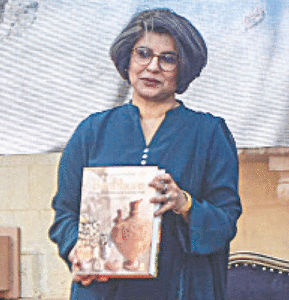KARACHI: The welcoming red carpet was not all, as you get the back of your hand stamped in red, the roses, rhododendrons, dahlias and zinnia also welcoming you all along the path, make you feel so special. And why not? It is your day because you are a part of the ‘Women of the World’. Everything about you is ‘Wow!’
The two-day Women of the World (WoW) Festival Karachi, organised by the British Council in collaboration with the British Deputy High Commission, which opened here at the Beach Luxury Hotel on Saturday, is back live again after a few years of going online due to the Covid-19 pandemic.
The opening performance by Shae Gill re-singing old Nazia Hasan hits and her own super hit ‘Pasoori’ sure woke up the audience that left their chairs, floor cushions and bolster pillows to surround the stage and cheer the singer on.
The inaugural session about ‘Building community resilience to climate change’, too, was a kind of wake-up call. Moderator Mahreen Khan in conversation with Quratulain Wazir, Ayesha Amin, Hira Wajahat and Dr Fazilda Nabeel reflected on women leaders’ responses to climate change, apocalyptic floods, relief efforts, lessons learnt and what the future holds.
Quratulain Wazir, assistant deputy commissioner in Nowshera, said that government officers like her were aware one month ahead of the rains last year that the monsoons were going to be tough. “So we started preparing one month before,” she said.
Issue of climate change discussed on opening day
“There is a protection wall by the Kabul River but when you are getting so much additional water in the river it is bound to overflow. We just had to evacuate the people. But I was told by our deputy commissioner that some people were reluctant to move. I had to do whatever I could to make them move. Quite understandably, the people were attached to their property and assets but I had to look after their safety. I was forceful. I threatened to call the police if they did not listen to me,” she said.
“In that area, the women are dependent on their male family members. They weren’t sure what to do. But we decided for them. We moved them and their cattle to ensure that there were no casualties among the humans as well as the animals,” she said, adding that some 475 homes were damaged in their area in the floods.
Hira Wajaha, who heads an impact consulting firm named Stimulus, said that they were not as knowledgeable regarding floods and flooding back in 2010 but now after four to five years of working with technologies, they were far better equipped with working on the field during such disasters.
Ayesha Amin from the NGO Baithak spoke about coping with women-specific issues in crisis situations. “Gender always comes as an afterthought. No one thinks about the women and their issues during such a crisis. No one thinks about their menstrual health because the topic is so stigmatised,” she said.
“The natural cycle of women doesn’t stop in crisis so you need to check how they are accessing pads, undergarments, etc. Is there anyone there to talk to girls? We met a girl at a flood camp who was going through natural bodily changes during the displacement when she had no access to bathrooms. Some girls were so confused as they had their own problems on top of which they had lost their siblings, too,” she said.
Dr Fazilda Nabeel of the Living Indus Initiative, meanwhile, said that the Indus River happens to be the world’s second biggest plastic polluted river. “But the rivers, too, have their rights as do the mangroves. There are rights of the ecosystem,” she pointed out.
“For over 5,000 years, the Indus has supported Pakistan’s population and Pakistan’s economy. But we have not cared about the laws of biodiversity. We need to advocate going back to nature. We need to involve communities. We need to promote ecotourism. We need to implement the Indus Protection Plan,” she said.
“Pakistan is among the top 10 climate vulnerable countries. Since 1961, Pakistan has not had an August this bad. It was the wettest August since 1961. This monsoon season was a direct result of global warming and such an extreme event was a trailer of things to come,” she said.
Others sessions on the initial day included Kamila Habib in conversation with classical dancer and activist Sheema Kermani and academic Taimur Rahim titled ‘With bells on her feet’, a music, arts and crafts and storytelling session for children titled ‘Olo taloto’, a session titled ‘Trans in Pakistan: vendetta, visual and village’ brought up questions and misconceptions that drive the campaigns against trans and khwaja sira voices and how the community comes together.
More live performances also included the ‘Drum circle’ where visitors were welcome to participate and feel the rhythm as they played the drums. There was also a marketplace with plenty of delicious snacks and handicrafts stalls.
Published in Dawn, March 5th, 2023













































Dear visitor, the comments section is undergoing an overhaul and will return soon.